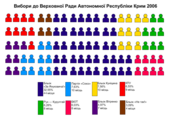The Our Ukraine–People's Self-Defense Bloc was an electoral alliance active in Ukraine from 2001 until 2012, associated with former President Viktor Yushchenko. Since 2005, the bloc had been dominated by a core consisting of the People's Union "Our Ukraine" party and five smaller partner parties. On 17 November 2011, the Ukrainian Parliament approved an election law that banned the participation of blocs of political parties in parliamentary elections. Since then several members of the Bloc have since merged with other parties.

The Socialist Party of Ukraine is a social democratic political party in Ukraine. It is one of the oldest parties and was created by the former members of the Soviet-era Communist Party of Ukraine in late 1991 when the Communist Party was banned. It was part of the Verkhovna Rada from 1994 to 2007 and was long the fourth biggest party of Ukraine. Since 2007 the election results of the party have been extremely marginal.
The Yulia Tymoshenko Bloc was the name of the bloc of political parties in Ukraine led by Yulia Tymoshenko since 2001. In November 2011 the participation of blocs of political parties in parliamentary elections was banned. The core party of the alliance, Fatherland, remained a major force in Ukrainian politics.
The All-Ukrainian Union "Fatherland" or Batkivshchyna is a political party in Ukraine, led by Yulia Tymoshenko. The party has been an observer member of the European People's Party (EPP) since 2008.

The People's Movement of Ukraine is a Ukrainian centre-right political party. Often it is simply referred to as the Movement. The party under the name Rukh was an observer member of the European People's Party (EPP) until 2013.

The Ukrainian parliamentary election took place on 26 March 2006. Election campaigning officially began on 7 July 2005. Between November 26 and 31 December 2005 party lists of candidates were formed.
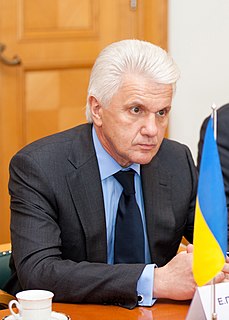
Parliamentary elections were held in Ukraine on 31 March 2002. The Our Ukraine bloc emerged as the largest faction in the Verkhovna Rada, winning 111 of the 447 seats.
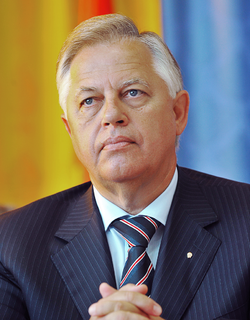
Parliamentary elections were held in Ukraine on 29 March 1998. The Communist Party of Ukraine remained the largest party in the Verkhovna Rada, winning 121 of the 445 seats.
The Christian Democratic Union is a political party in Ukraine. On December 2, 2002, in Athens, Greece the party became a member of Centrist Democrat International. It is negotiated now its associated membership in the European People's Party. The party also publishes a newspaper called Християнський демократ.

The State Council of Crimea is the parliament of the Republic of Crimea. It had previously been called the 'Supreme Council of Crimea but changed its name in March 2014 following a vote by the Ukrainian parliament to dissolve the Supreme Council of Crimea. The Parliament is housed in the Parliament building in the centre of Simferopol.
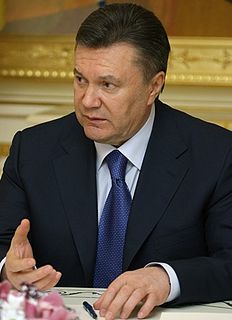
Early parliamentary elections in Ukraine took place on 30 September 2007. The date of the election was determined following agreement between the President Viktor Yushchenko, the Prime Minister Viktor Yanukovych and the Chairman of the Verkhovna Rada Oleksandr Moroz on 27 May 2007, in an attempt to resolve the political crisis in Ukraine triggered by the 2 April 2007 presidential decree on dissolution of Ukraine's parliament.

The Party "Soyuz" is a national political party of Ukraine that is mostly based in Crimea. It was registered in June 1997 under a registration number 867.
The first relatively free election to the Supreme Soviet (Rada) held in the Ukrainian Soviet Socialist Republic took place in several stages, from March 4 to March 18, 1990. The elections were held to elect deputies to the republic's parliament, the Verkhovna Rada. Simultaneously, elections of local provincial ("oblast'") councils also took place in their respective administrative divisions.
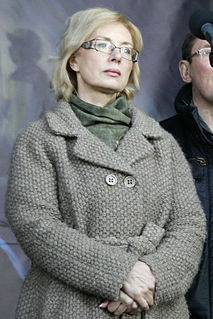
Lyudmyla Leontiivna Denisova is a Ukrainian politician and former Minister of Labor and Social Policy who on 15 March 2018 was elected Commissioner for Human Rights in Ukraine.

The 2010 Crimean parliamentary election were held on 31 October 2010 as a part of the general 2010 Ukrainian local elections. Unlike the previous election to the Verkhovna Rada of Crimea, they were conducted on the mixed member proportional representation system. In order to gain representation in the Parliament of the Autonomous Republic of Crimea, a party or bloc had to garner at least 3 percent of the total vote. The Party of Regions won the elections with an overwhelming majority.
Party of Economic Revival was a political party in Ukraine set up by former communists in Crimea in November 1992 as Party of Economic Revival of Crimea. It was suspected of having ties with organized crime. The party was dissolved by the Ukrainian Ministry of Justice in 2003.

A snap election of the Verkhovna Rada took place on 26 October 2014.

Serhiy Kunitsyn is a Crimean politician, and former veteran of the Soviet–Afghan War.
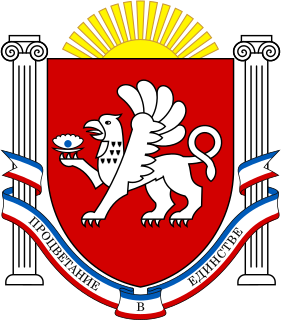
![Autonomous Republic of Crimea administrative division of Ukraine since 1992, not occupying the whole peninsula [see Q15966495 for Russian subdivision proclaimed in 2014]](https://upload.wikimedia.org/wikipedia/commons/thumb/a/aa/Flag_of_Crimea.svg/320px-Flag_of_Crimea.svg.png)
